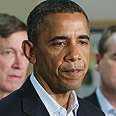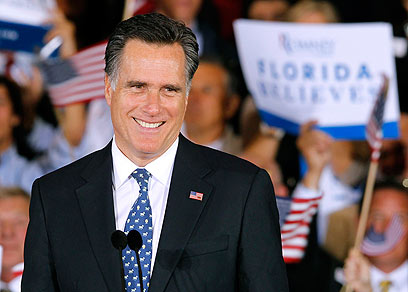
Why Obama's Jewish margin in Florida could be critical
Florida polls show Obama losing support among Jewish voters; may lose state to Romney in 2012 election. 'Jewish voters, like all voters, have been impacted by still-struggling economy,' Romney campaign advisor says
Selma and Kenneth Furst were among the hundreds of thousands of Florida's Jewish voters who helped put Barack Obama in the White House four years ago.
This time out, the Fursts are still solidly behind the president, but they aren't so sure about some of their Jewish neighbors and friends.
"It's a hard decision, for people to make up their minds," said Selma Furst, 91, who lives in a condo community in Tamarac, a city of 60,000 near Fort Lauderdale, with her husband, Kenneth, 94. "My neighbors talk about it a lot, and we think about it all the time."
Polls suggest Obama has lost some ground since the 2008 election among Jewish voters in Florida, a key battleground state. That could have a major impact in what is likely to be a tight race, analysts say. While Jews make up only about 3.4% of the population in Florida, they have historically turned out in disproportionately high numbers.
"From the polling I've seen, the president's support among Jewish voters is at historic lows, compared to other Democrats for president, and it's something we're seeing anecdotal evidence of on the ground," said Alberto Martinez, an adviser to the campaign of presumptive GOP presidential nominee Mitt Romney.
"No one expects Romney to win the Jewish vote. But any level of attrition for the president is going to endanger his reelection in a state like Florida," he said, recalling the 2000 election, in which George W. Bush won the state by 537 votes.
It's not clear how much support the president can afford to lose in Florida. Andre Fladell, a longtime Democratic activist from Delray Beach, said he doesn't believe a 10% to 14% drop in the polls among Jewish voters would make a difference, but "a 24% to 26% drop would," he said.
The key, he said, will be voting trends among the almost 500,000 Jewish voters in the Democratic stronghold of South Florida.
Debate there over Obama administration policies on everything from healthcare and jobs to Israel and the Middle East has crept into neighborhood events, temple meetings and other social functions in the Jewish retirement communities.
The administration's policies on Israel are one reason some Jewish voters may be reconsidering their support for Obama, said Martinez, particularly in the face of a perceived nuclear threat from Iran.
Obama has also had a rocky relationship with Israeli Prime Minister Benjamin Netanyahu, with the two clashing over Israel's settlement policy and efforts to revive the peace process.
The still-struggling economy, nationally and in Florida - where, with more than 1 million people out of work, the unemployment rate is higher than the national average - is also a primary factor. "The bigger picture is that Jewish voters, like all voters, have been impacted by (it)," said Martinez.
"I voted for Obama in 2008, but I don't anticipate voting for him in the upcoming election," said William Levine, a Boca Raton, Fla., resident. He said Obama's position on Israel and Mideast affairs was "a significant factor," but he also cited domestic issues, including the president's handling of the economy.
A Gallup Poll released in June found what some have called a surprising drop in Jewish support for the president. The national poll showed 64%of registered Jewish voters are behind Obama, with Romney pulling 29%.
Gallup Polls just prior to the 2008 election had Obama garnering 74% among Jewish voters, with 23% favoring GOP nominee John McCain. Exit polls indicated the president received as much as 78% of the Jewish vote on Election Day.
The latest Gallup survey was relatively small: It polled 576 registered Jewish voters from April 11 to June 5, with a margin of error of plus or minus five percentage points. Republicans seized on the figures.
The new polling figures are noteworthy in part because Jewish voters have historically turned out in greater numbers than other larger voting blocs, such as Hispanics and African Americans.
Ira Sheskin, a University of Miami professor who runs the Jewish Demography Project of the Sue and Leonard Miller Center for Contemporary Judaic Studies, told Reuters that upwards of 90% of registered Jewish voters usually turn out on Election Day. In 2008 that figure reached 96%.
"Jews are probably 7% to 8% of the people who actually vote in Florida," said Sheskin, who has tracked Jewish voting records since the 1970s. "So if Obama only gets 64% of the Jewish vote in November, that could be significant. But it's only July ... so it's too early to declare."
Sheskin noted that while Jews consider US policy on Israel an important issue, it's not a driving force in candidate choice.
'Harsh sanctions on Iran'
"They're voting on the economy and social issues, and Jews are overwhelmingly pro-choice, in favor of same-sex marriage, the Affordable Healthcare Act ... and are much closer to Democrats than Republicans."
Some Democrats say Obama's support among Jews is rising. An American Jewish Committee survey in March found Obama with less support than in the most recent poll. Then, he bested Romney by a margin of 61% to 28%.
"There actually has not been an erosion of support," said Florida congresswoman and Democratic National Committee Chairwoman Debbie Wasserman Schultz. "Consistently, you have major polling that is actually far more sophisticated, with larger sample sizes of Jewish voters that have been done very recently, that show the president's support is actually quite a bit stronger than that poll showed." Gallup Polls in June 2008 showed Obama held only 62% of the Jewish vote in Florida, before rising to 74% in November.
Martinez and other Republicans point to some anecdotal indications that Obama's lock on the Jewish vote in Florida may not be ironclad.
Last May tempers flared during an event at Congregation L'Dor Va-Dor in Lake Worth that brought together local Republican and Democratic leaders for a debate provocatively titled, "Obama and Israel: Friend or Foe?" Speakers in support of Obama were interrupted with frequent insults, and moderator Rabbi Barry Silver had to step in to maintain order, according to reports in the Florida Jewish Journal.
Wasserman Schultz, the first Jewish woman from Florida elected to the House of Representatives, attributed such high-profile events to partisan politics.
"The reason lying and distorting and misrepresenting President Obama's stellar record on Israel is because they know they can't get anywhere with Jewish voters in America on domestic issues," she told Reuters. "So in the battleground states in particular - like Florida and Pennsylvania and Ohio, where the Jewish communities are more concentrated - they are deliberately spreading lies and mistruths."
Although Obama has yet to visit Israel as president, he did make two trips to the Holy Land while he was in the Senate, including one during the 2008 election campaign. George W. Bush did not visit Israel until the last year of his second term, Obama supporters point out.
Supporters defend Obama's record on Israel, saying the president has consistently shown his willingness to fund and promote efforts to maintain Israel's military strength. Wasserman Schultz said Obama spearheaded efforts to impose "harsh sanctions" on Iran to halt its nuclear programs, supported a two-state solution to the Israeli-Palestinian conflict and backed development of the "Iron Dome" missile defense system for Israel.
The Romney campaign has increased efforts to make inroads with Jewish voters in recent months. Martinez said the campaign has opened 30 offices in the state and is stepping up "outreach to communities, and specifically the Jewish community in Florida."
Romney's Florida campaign has also tapped Jewish Republican Tevi Troy - former deputy secretary of the Department of Health and Human Services under President George W. Bush - as an adviser.
In addition, the former Massachusetts governor recently announced plans to host a fundraising event in Jerusalem - at $60,000 or more per plate - on July 29, the Jerusalem Post reported. Campaigning in Florida earlier this year, Romney accused Obama of being "critical of our friends," citing the president's objections to Israel's settlement policy.
Mik Moore, a spokesman for the pro-Obama super-PAC known as the Jewish Council for Education and Research, acknowledged that Republican efforts to woo the Jewish vote may be having an impact in Florida.
"We know there's about 14% to 15% of American Jewish voters who voted for (Obama) before who right now are not ready to vote for him," he told Reuters. "This year, young people are not as energized as they were in 2008, so the challenge ... is talking to (swing voters) about the president's record and contrasting it with Romney's record."
The Obama campaign has ramped up its Jewish outreach efforts, too. In June the president's chief of staff, Jack Lew - an observant Jew - met with South Florida campaign operatives about how to turn out voters through the campaign's Jewish Community Leadership Council program.
Wasserman Schultz has also been working for Obama in South Florida, penning op-ed pieces in newspapers and Jewish publications detailing the president's record on Israel.
Selma Furst said she understands why many of her Jewish friends and neighbors are wavering in their support for Obama. She says she had to overcome her own doubts about Obama when she voted for him in 2008.
Now, though, she is comfortable with her decision. "I feel he's had four years' experience and maybe that four years taught him something," she said. "I know not everything is his fault. You can't make gold out of paper."











